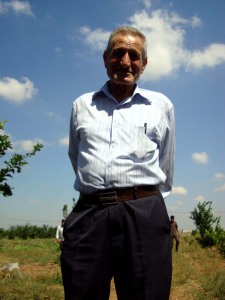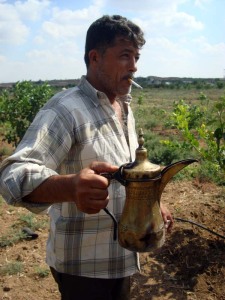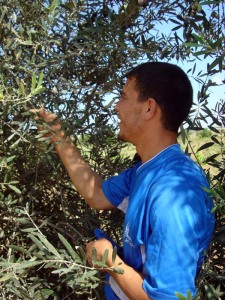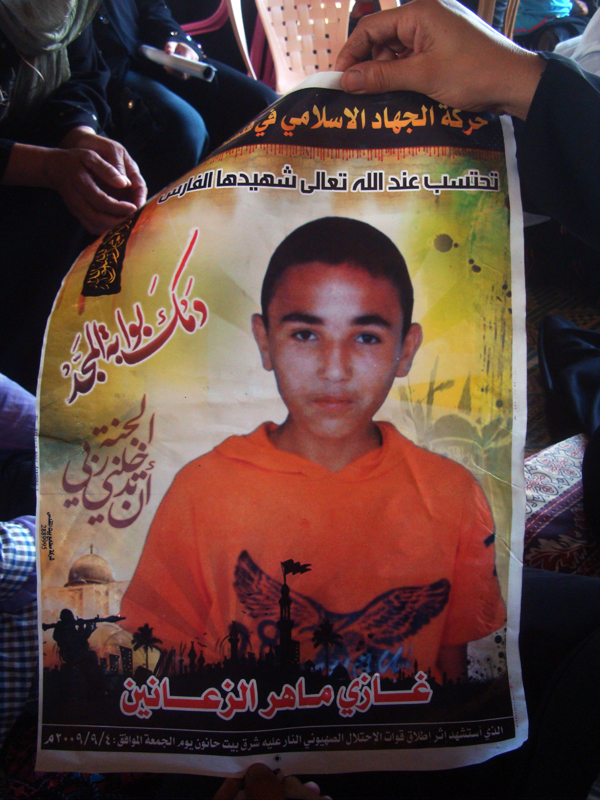In Gaza

A day of olive picking in Gaza’s north. A day of traditional Palestinian songs, and teasing, olive stains, and stories of lost olive trees and bulldozed homes. We, a number of Palestinian and international volunteers [ISM and other], are participating is because of the danger of Israeli soldiers opening fire on the harvesters –the trees are roughly 1 km from the northern border wall, and while Israeli officials say their Israeli-imposed “buffer zone” extends only 300m, experience has shown that farmers and civilians near that arbitrary line are subject to lethal shooting.
The Palestinian contingent is the lively “Local Initiative” group from Beit Hanoun. On most accompaniments, I’ve seen a couple of men in their 30s and 40s, likewise women, and the rest are high school or university age males and females.
One of the coordinators, Khalil, is slightly crazy, as are all good, inspiring folks. While waiting for the group to congregate, we sit roadside beneath the shade of orange trees. He’s pilfered some oranges, but the trees’ owner is sitting across the street and brings his chair over to join us.
Khalil is a bit of everything. During the winter Israeli massacre, he was a volunteer medic in Beit Hanoun. Post-massacre, he’s resumed his full-time volunteering with the Initiative. During Palestinian Land Day celebrations, he was vocal and active, leading chants, songs and Dabke. Likewise during a demonstration in the east Beit Hanoun border region, protesting the Israeli army’s continued shooting at and of civilians (minus the Dabke that day, but he led prayers instead).

And, it turns out, he teaches sign language. So waiting under the orange trees, we learned Palestine (a shoulder brushing movement which seems to have originated from the way Yasser Arafat drooped his kuffiyeh over his shoulder); Bahrain (a wavy movement mimicking waves; Bahar is ‘sea’ in Arabic, tho the Bahrain and similarity to ‘bahar’ could be coincidental); Nablus is the action of washing hands (famous for its olive oil soap); and he goes on teaching, but I’m a slow student.
At the land, we meet the owner, an elderly Palestinian who has lost most of his ancient olive trees to Israeli bulldozers and attacks. There are a meagre 10 or so which we harvest today.
Saber Zaneen, the main coordinator of the Local Initiative, and as crazy and intelligent as Khalil, leads the songs. He knows many a traditional song, pulls them out of his kuffiyeh for the right occasion. Today he’s had to refresh his memory, has the lyrics of a folk song on olive harvesting printed out to help his memory.
The land owner interrupts us for more coffee and a variety of sticky, nutty Palestinian sweets.



I’m led away to scour the bean crops, given a handful of fresh, sweet beans, and break a bit to photograph harvesters at work and play.
Abu Alaa Suheilam, having served coffee from a graceful old urn, sits down next to me to speak of his losses.

“We had five houses over there, near the border fence,” he points to at least one visible pile of rubble about 1 km away from us.
I note that today is relatively calm, certainly compared to other accompaniments. But we are further away and great in number.
“I came here after the war to see our land,” Abu Alaa continues. “They began shooting right away,” he says of the Israeli soldiers.
“My father died during the war. We had left our home and were staying with our relatives. When my father heard our houses were destroyed, he had a heart attack from the loss.”
The 30 dunams (1 dunam=1000 square metres) that make up their land have been off-limits for the last 7 years, he says. His story mirrors that of farmers and civilians in and near the Israeli-imposed “buffer zone” [in theory 300m but in practise up to 2 km in areas] who speak of being forced off their land at gunpoint and of losing ancient olive and fruit trees to the Israeli military bulldozers in their repeated invasions.
Further down the row of trees, Fida is singing softly as she picks, her voice a tender lilt. “It’s a song my grandmother taught me. A traditional Palestinian song,” she says. “We have songs for almost every subject,” she continues, going on to explain the love song she’s rendering. In university, vivacious, intelligent, adept at English, and charming, Fida is one of the many female volunteers in the group.
It is pleasant work, and despite the expectation of shooting from the Israeli soldiers border-side, we work comfortably. I recall 2007 harvests, under attack by slingshot wielding Israeli settlers one time, forced off the land by Israeli soldiers acquiescing to the mass of settlers that had streamed down a hill (some with clubs and guns in hand).
And although I know the answer, I always wonder: why does the simplest act have to be so damn hard?
We pack up and pack into a minibus, sitting on top of one another. Saber and Khalil lead the songs again, some light teasing of myself and other volunteers, but all in good fun.





